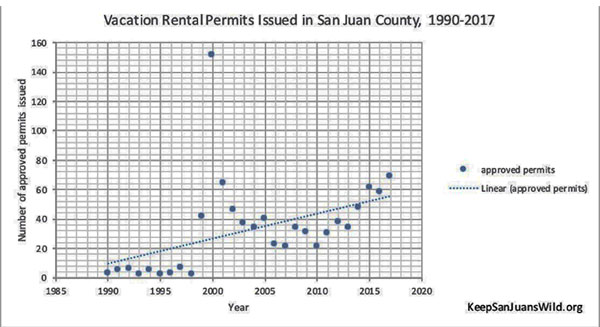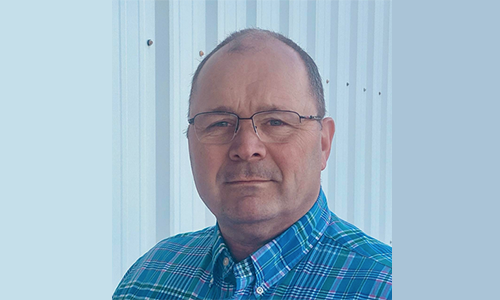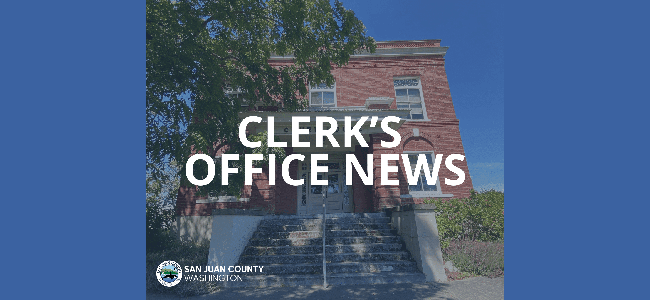— from Joe Symons —
I’m starting a series of commentaries on the future of our archipelago given that San Juan County (SJC) is crafting an update to its Comprehensive Plan as required by the Growth Management Act.
These commentaries complement a book of essays (free!) available at https://doebay.net/cpupdate/pathlessibook.pdf
The commentary here discusses the growth in the issuance of Vacation Rental Permits, which are an expected consequence of the growing demand by visitors to spend time in the San Juans.
In December 2018 I downloaded San Juan County Vacation Rental Permit (VRP) data from the county’s GIS website. The data covers the period from 1990 to 2018. During this period 1050 vacation rental permits were issued. Of these, 967 were approved.
I plotted the issuance of VRP’s per year on a chart, available at https://doebay.net/sunshine/vrpannualchart.pdf

Readers interested in the source data can find it at https://doebay.net/sunshine/vrpannualexcel.pdf
As is obvious from the chart, and consistent with anecdotal observation,the almost 30 year trend line for the issuance of VRPs shows a steady increase.
It is my understanding that the recently approved modifications to the VRP regulations do not restrict the number of VRPs that may be issued, either by island or by location on island (rural, waterfront,activity center, etc.).
To my knowledge there has never been an informed comprehensive public conversation regarding the impact of visitors. Visitor impacts are not reviewed or part of the GMA CP update process, I believe the county owes the residents (read: voters) a thoughtful, comprehensive and action-oriented opportunity to seriously discuss the clearly-growing challenges and impacts of visitors and the options available to manage these impacts consistent with a vision statement that calls for a rural, slow, quiet, “isolated nature” that is the reason most residents have moved here and wish to stay here.
The “Nantucket Study”, done for SJC in 2000, is neither mentioned nor available on the county’s web site. You can read it at
As noted in the conclusions section of the cover letter to the study, SJC was (in 2000) considered exactly on track to be like other resort communities like Nantucket and Aspen. Just 20 years behind. It is now almost 20 years after the study was done. None of the recommendations of the study were ever discussed much less implemented. (Your tax dollars at work). Without wanting to be cynical or snarky, this is not a failure of government. It is a failure of all of us to hold our elected representatives accountable.
Visitors do not come here to be in crowds; their experience is contingent on the consistency of individual and organizational marketing with the reality; we are supposedly selling tranquility, rural beauty, small scale, community, but we are not by any means preserving those qualities. By the undiscussed and unregulated privatization of our public assets, we are killing the goose that lays the golden egg. This hurts everyone: locals, part time property owners and visitors alike.
As a vacation rental service provider for over 25 years, I believe we have to share our space rather than make it an exclusive enclave for the wealthy and much of the local population that lives close to poverty to serve them. At the same time, the race to the bottom, a consequence of our failure to discuss and impose limits on the number of visitors served, has and will continue to impoverish us economically, culturally and environmentally.
I spoke with our state Senator who lives on Orcas regarding the crowding in Eastsound in the summer. He told me he does not come to Eastsound between April and October because of the crowds. Anyone who lives here knows what the ferries, parks, trails, roads, water(wells) and towns are like during the peak months.
I urge readers and decision makers to speak up regarding the trendlines and impacts that this data reveals. San Juan County should no tbe “for sale”. It should not be a vehicle for privatizing public assets, certainly not without serious and considerable public discussion. KeepSanJuansWild.org discusses the many growth and impact issues on the table that you will not be reading about from the formal notices and official hearings on the Comp Plan update.
Your silence reinforces the current leadership vacuum where no, or the least possible, action will be taken to address, much less engage in, the tough conversations that will reverse the Tragedy of the Commons (https://www.hendrix.edu/uploadedFiles/Admission/GarrettHardinArticle.pdf) occurring here in your home islands.
Let’s prove that “we really do it different here than on the mainland.” Your pocketbook, sanity, community values and reason for being here are on the table. We all need to be at the table rather than on it.
**If you are reading theOrcasonian for free, thank your fellow islanders. If you would like to support theOrcasonian CLICK HERE to set your modestly-priced, voluntary subscription. Otherwise, no worries; we’re happy to share with you.**








An “informed comprehensive public conversation about the impact of visitors” sounds like a great place to start, if we, current SJC residents are to have a say and make some choices on how the future of the San Juan Islands evolves…and as the saying goes, failing to choose is also making a choice.
Thank you, Joe. I shall start by reading the Nantucket study.
Joe—apologies but I’m taking one of your sentences out of context; still, I believe the below questions stand.
You write:
“As a vacation rental service provider for over 25 years, I believe we have to share our space rather than make it an exclusive enclave for the wealthy and much of the local population that lives close to poverty to serve them.”
Without placing a value judgment on this sentence & from the point of view of preventing the irreplaceable loss of the island’s ecosystem, does your sentence hold water logically?
Extrapolating further- r u using your preferred politics & economic class to sacrifice ecology all the same via selective application of what should be neutral scientific standards as in objective reality?
Further still, r u placating a particular political spectrum on Orcas by saying if you’re of a particular class then destroying/overuse is bad; but if you’re not then it’s okay to destroy the island’s fragile ecosystem via overpopulation and abuse through overuse?
Are you subtlety creating a choice between Nantucket, or a future overpopulated, low-income tax base that’s akin to a socially progressive commune-like habitat? Or do you see something in between?
Either way, both models do the dirty deed vis-a-vis the environment because both models allow overgrowth on a finite, non-expandable island footprint.
So, is this just more politics?
If so, would cynicism from developers & the vacation rental industry be justified?
One could say never trust a human to care for mother nature as it’s akin to a fox watching the hen house. But then I’m jolted out of my self imposed coma and exile first brought about by evolution and natural selection and awake today (hopefully early enough) to the reality that I’m every bit the very “mother nature” that’s doing what it, the human animal, does quite naturally in its less conscious state. So what’s with all the moralizing? Isn’t it time we awaken and stop pretending we’re not ghostwriting this human script while sleepwalking? Isn’t it time to move past the unworkable restraints and shackles imposed by taboos and belief systems which, in the end, throw their hands in the air resigning all to fate? Isn’t it time we become a bit more self-aware and consciously take up the reins and responsibilities of authoring this human story? We’re more than on the cusp of being able to do so technologically and scientifically; I’d go further and say some already are but in the shadows (dangerous); isn’t this all the more reason not to remain in exile and absent from our own party. We might even be able to write a happy turn of events into this semi-tragic human melodrama. Do I ask too much?
Are there reliable data on how many of those permits are active? Before, they did not need to be renewed. Now, they must be renewed. Those are the data we should be looking at.